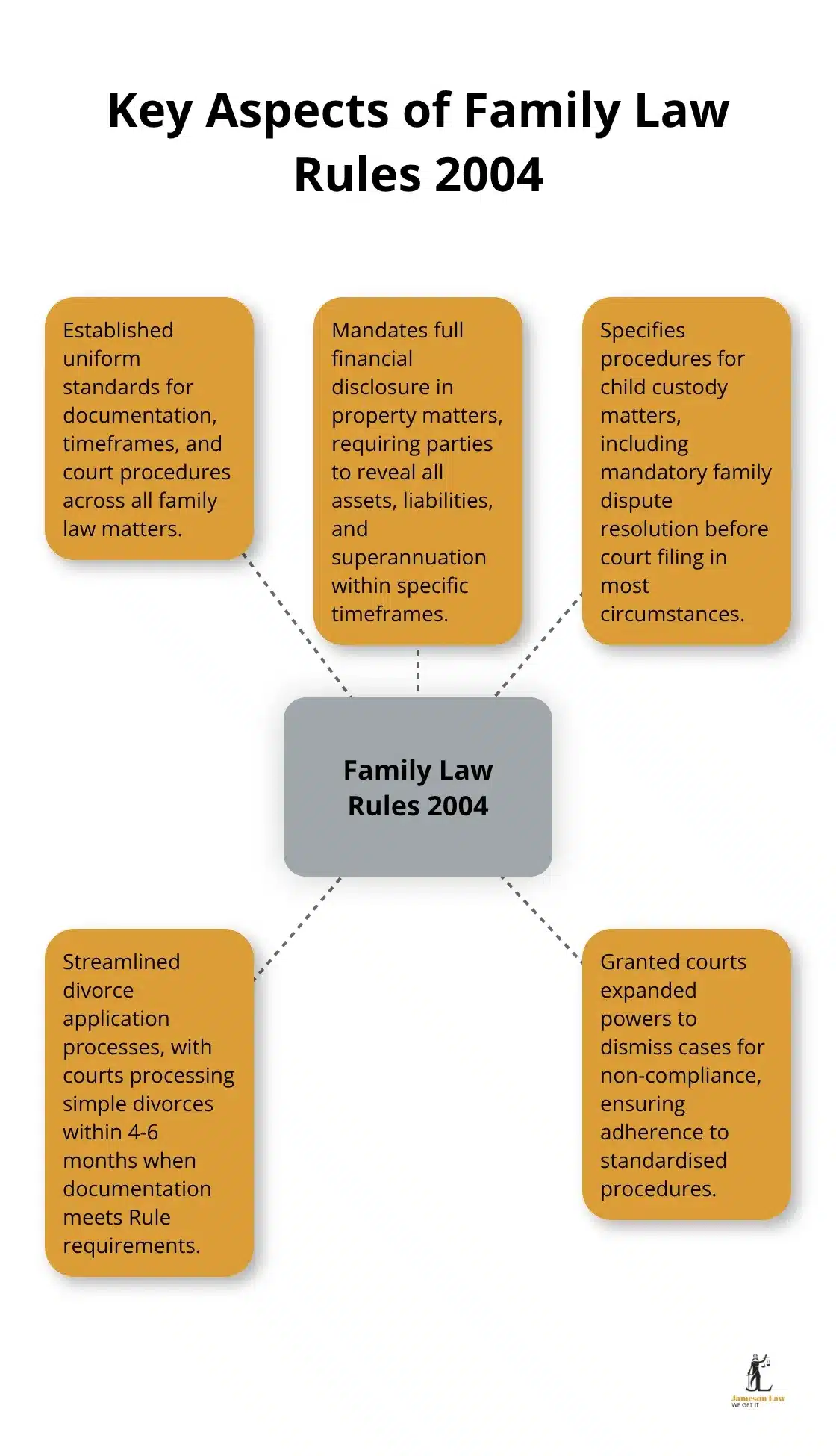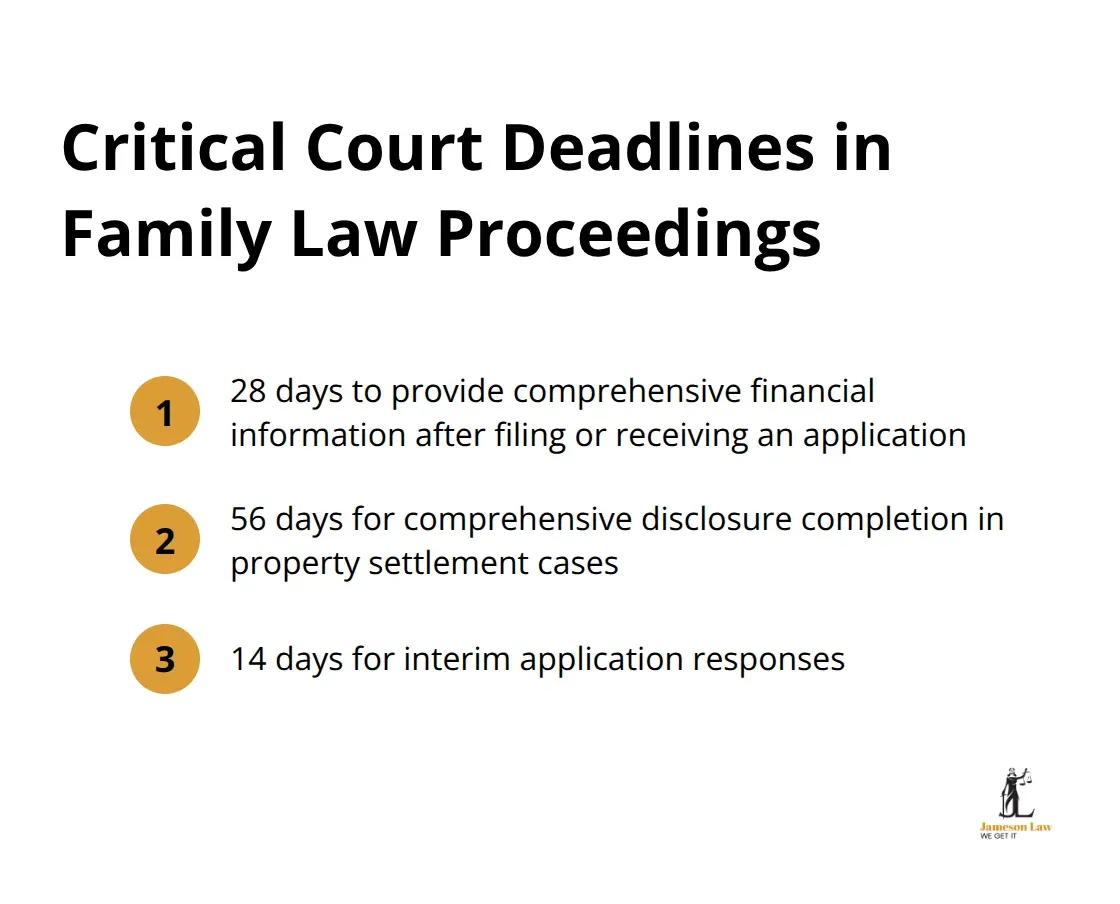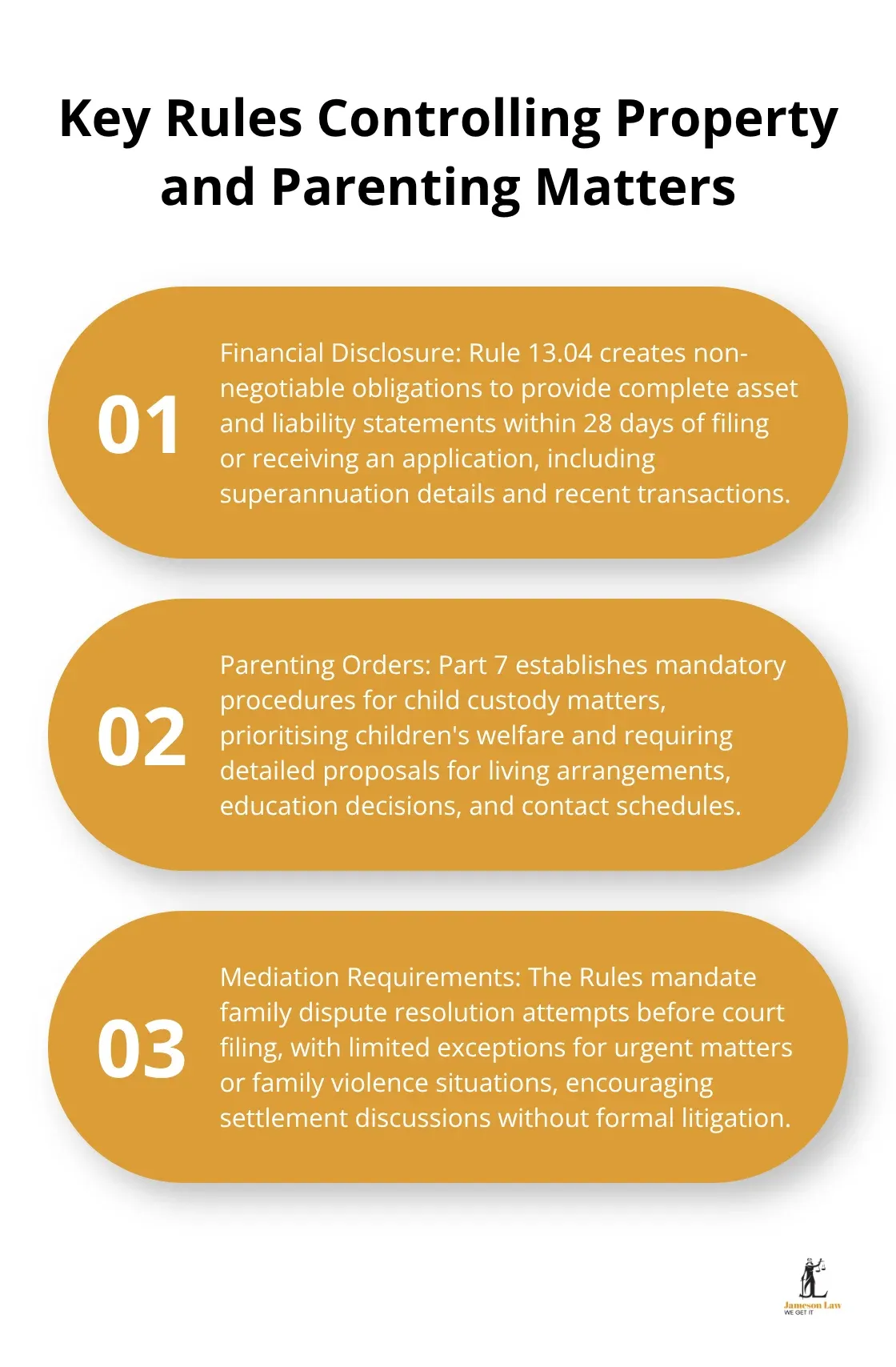The Family Law Rules 2004 transformed how Australian family courts operate, establishing clear procedures for property settlements, child custody matters, and dispute resolution. These rules affect every family law case filed in federal courts.
We at Jameson Law see families navigate these complex requirements daily. Understanding these procedural rules can make the difference between a smooth court process and costly delays.
What Are the Family Law Rules 2004
The Family Law Rules 2004 established mandatory procedures that govern every aspect of family law proceedings in Australia’s federal courts. These rules replaced a patchwork of inconsistent practices and created uniform standards for documentation, timeframes, and court procedures across all family law matters.
Foundation and Structure of the Rules
The Rules contain 25 comprehensive sections that cover everything from initial applications to final orders. Rule 13.04 mandates full financial disclosure in property matters and requires parties to reveal all assets, liabilities, and superannuation within specific timeframes. Courts gained expanded powers to dismiss cases for non-compliance, with the Federal Circuit and Family Court of Australia processing family law applications annually under these standardised procedures. The Rules eliminated previous jurisdictional variations, which means identical procedures now apply whether you file in Sydney, Perth, or regional courts.
Property Settlement Procedures
Property settlement cases must follow the disclosure requirements under Part 13, with parties facing potential penalties for incomplete financial statements. The Rules require parties to provide comprehensive financial information within 28 days of filing (or receiving) an application. Courts can set aside consent orders when parties fail to make full disclosure, as demonstrated in Trustee of the Bankrupt Estate of Hicks & Hicks & Anor [2018], where undisclosed debts of $606,000 affected the property settlement decision. For an overview of disclosure duties, see the court’s guidance on duty of disclosure and our notes on property settlements.
Child Custody and Parenting Pathways
Child custody matters operate under Part 7 procedures and require mandatory family dispute resolution before court filing in most circumstances. The Rules specify that parties must attempt mediation or other dispute resolution methods unless exceptional circumstances exist (such as family violence or urgency). Courts process applications more efficiently when parties complete these preliminary steps and provide required documentation about children’s best interests. Learn more about parenting orders.
Divorce Application Processes
Divorce applications follow streamlined Part 6 processes, with courts processing simple divorces within 4 to 6 months when documentation meets Rule requirements. Each matter type has distinct filing forms, service requirements, and procedural steps that courts strictly enforce to maintain case flow efficiency. See the court’s official guidance on divorce and current forms.

How Do You Meet Court Filing Requirements
The Family Law Rules impose strict documentation standards that courts enforce without compromise. Form selection determines case success, with incorrect forms triggering automatic rejections that delay proceedings by months.
Updated Form Requirements
Application in a Proceeding forms replaced the previous Application in a Case forms, and courts stopped accepting old forms after 29 November 2021. Courts reject applications that use outdated documentation, forcing parties to restart their filing process. The transition period ended definitively, which means only current forms receive court acceptance. Access the latest court forms directly.
Financial Statement forms require complete asset disclosure, including superannuation details, property interests, and debts from 12 months before separation. Missing information triggers court orders for compliance, adding weeks to your timeline.
Meeting Critical Court Deadlines
Court timeframes operate as absolute requirements under the Rules, with missed deadlines resulting in case dismissal or default judgments. Response documents must reach the court within 28 days of service, while financial statements face the same 28 day window.
Property settlement cases allow 56 days for comprehensive disclosure completion, but courts grant extensions only for exceptional circumstances. Interim application responses require 14 days, creating tight windows for legal preparation. The Federal Circuit and Family Court processes applications faster when parties meet these deadlines consistently. For time limits and practice directions, see the court’s practice directions.

Document Service Standards
Service requirements under Part 6 demand strict compliance with notification procedures that courts monitor closely. Personal service remains the gold standard, requiring documents to reach the other party directly through approved methods.
Substituted service applications become necessary when standard service fails, but courts require evidence of genuine attempts before approving alternative methods. Email service works only with written consent from all parties, while postal service needs specific address verification.
Service affidavits must detail exact service methods, times, and locations to satisfy court requirements for procedural fairness. For step by step guidance, see the court’s page on service of documents and LawAccess NSW on serving family law documents. These procedural foundations directly impact how courts handle the substantive aspects of your case, particularly the specific timeframes that govern different types of family law proceedings.
What Rules Control Your Property and Parenting Matters
Property Settlement Financial Disclosure
Rule 13.04 creates non-negotiable financial disclosure obligations that courts enforce rigorously. You must provide complete asset and liability statements within 28 days of filing or receiving an application. This includes superannuation details, business interests, and all transactions within 12 months before separation. Courts can set aside consent orders when parties hide assets, as demonstrated in the Hicks case where undisclosed debts of $606,000 invalidated the entire property agreement. Missing information triggers court compliance orders that add months to your case timeline and thousands in legal costs.
Parenting Orders and Best Interests Framework
Part 7 establishes mandatory procedures for child custody matters that prioritise children’s welfare above parental preferences. Courts require evidence of attempted family dispute resolution before they accept applications (unless family violence or urgency exceptions apply). The Rules specify that parenting applications must include detailed proposals for living arrangements, education decisions, and contact schedules. Courts process applications faster when parents provide comprehensive information about children’s current circumstances, school arrangements, and healthcare needs. See also Family Relationships Online for FDR pathways.
Mediation Requirements Before Court Action
The Rules mandate family dispute resolution attempts before court filing, with limited exceptions for urgent matters or family violence situations. Courts reject applications that lack proper mediation certificates, which forces parties to restart their legal process. Mediation services must meet accreditation standards under the Family Law Act, and courts verify compliance before they proceed with contested matters. This requirement reduces court caseloads while it encourages settlement discussions that often resolve disputes without formal litigation costs.

Enforcement and Compliance Mechanisms
Courts possess broad powers to enforce Rule compliance through various sanctions and penalties. Non-compliance with disclosure requirements can result in adverse cost orders that make the non-compliant party pay the other side’s legal fees. Courts may also draw negative inferences about undisclosed assets when parties fail to meet their obligations. The Rules empower judges to dismiss applications entirely when parties repeatedly ignore procedural requirements, which protects the integrity of the court system while maintaining fairness for compliant parties.
Final Thoughts
The Family Law Rules 2004 establish the procedural backbone for every family law case in Australia’s federal courts. These rules control critical aspects of your case, from mandatory financial disclosure within 28 days to required mediation attempts before court filing. Non-compliance carries serious consequences that include case dismissal, adverse cost orders, and set-aside consent orders.
Property settlement cases face strict disclosure requirements under Rule 13.04, while parenting matters must follow Part 7 procedures that prioritise children’s best interests. Courts process applications efficiently when parties meet documentation standards and deadlines, but delays and penalties await those who ignore these requirements. The complexity of these procedural requirements makes professional legal guidance essential for most families.
Missing a critical deadline or incorrect forms can derail your case for months (particularly in complex property settlements or contested parenting arrangements). We at Jameson Law help families navigate these procedural requirements while they focus on their specific outcomes. Expert family law assistance becomes particularly valuable when procedural missteps can prove costly. For official forms and instructions, visit the court’s forms hub.













